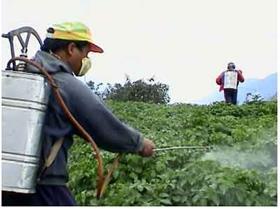
The European Crop Protection Association (ECPA) is pushing for legislative improvements to help control the increasing number of illegal pesticides available across Europe.
The group will bring its concerns to the European Parliament during Anti-Counterfeit Week, which has been organised by the European Observatory on Counterfeiting and Piracy, outlining dangers such as environmental issues, consumer health and damage to the food supply reputation of an agricultural region.
'Loopholes in the EU's current legislative framework for controlling the shipment of chemical products are providing an open door for the entry of counterfeit pesticides,' said Friedhelm Schmider, director general of the ECPA. 'We are collaborating closely with customs, regulatory authorities and enforcement agencies around Europe to use existing legislation more effectively, but to stop the traffic we need a legal framework that is better designed to deal with this specific threat.'
Mr Schmider noted that farmers, consumers and the environment all required strong legislation to enforce the integrity of the supply chain, and said that rapid action to adjust EU legislation would make swift detection and eventually prosecution a reality.
Currently, EU legislation focuses more on intellectual property aspects as opposed to safety issues which, ECPA said, impedes actions that customs, regulatory and enforcement officials can take to quickly seize incoming shipments and carry out successful investigations.
'These products do not contain the ingredients claimed nor do they conform to any safety regulations,' Mr Schmider continued. 'They are shipped by organised crime and have become a very lucrative business – generating over €1bn a year.
'Shipments are made using fraudulent documents and packaging. Sometime highly flammable substances are shipped by air without warnings or precautions, posing a great hazard,' he added. 'Transport companies including airlines and vessel companies need to make sure they do not work with counterfeiters and deliver counterfeits to the EU by taking steps to know their customers.'
The partnering of customs and enforcement agencies has achieved positive results, Mr Schmider said, but helpful legislation was 'urgently needed' to accelerate activity and stamp out illegal trading.
According to ECPA data, the traffic in illegal pesticides has grown significantly over the past 10 years across Europe, with the illegal market generating an estimated value of €1bn per year.



